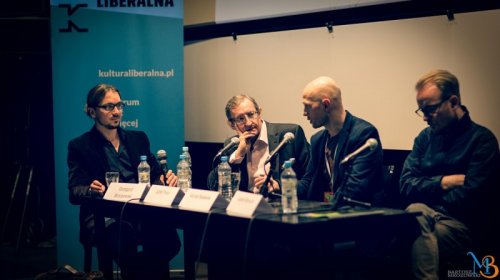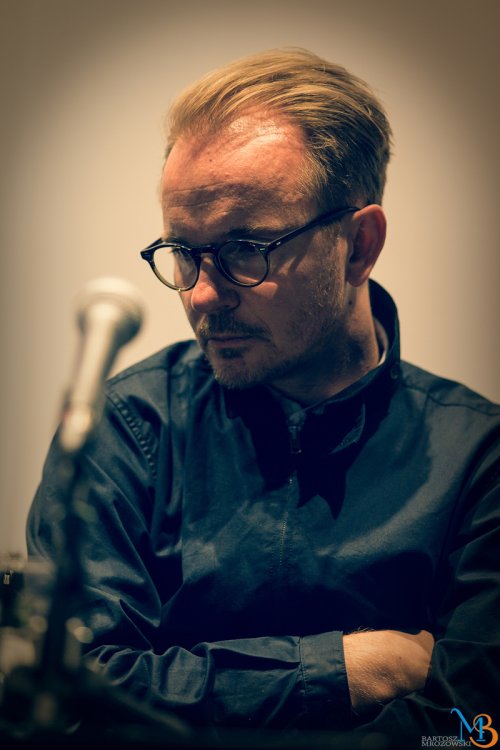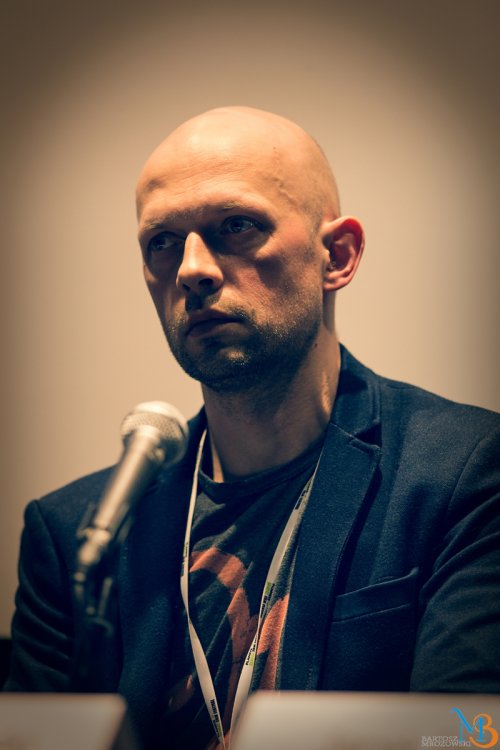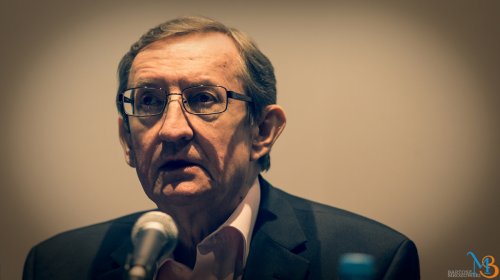Why has Poland’s turning point of 1989 not earned its own visual symbol yet? How are the times of the transformation perceived by both younger and older generations? Grzegorz Brzozowski in conversation with Michał Bielawski, Jacek Borcuch and Józef Pinior, during the Planete+ documentary film festival.
GB: Is there a moment in the way you recall the year 1989 which represents a sense of definite change, one which could form the basis of a national holiday or celebration? And if such moments were missed, then why?
JP: Remembering 1989 – also while watching the film by Michał Bielawski – I have mixed feelings. On the one hand, we were convinced then that we are dealing with events of epic importance, totally fundamental and positive, and on the other, one could feel the disorientation, confusion or even lethargy. At the time, we had no idea, though today we know the process of the Transformation ended with the introduction of radical market reforms, which then led to many thousands of people feeling humiliated and marginalised. At the same time, in the current narratives dedicated to those events there appears an ultra-optimistic tone, along with the conviction that these were wonderful, grand, historical achievements, ones which should be recognised and valued all over the world.
And now speaking totally seriously, I am afraid that it is no longer possible to create a sense of unity around the events of the 4th of June, and thereby turning the date into something akin to Bastille Day in France or Independence Day in the US. All the more so when we consider 1980, when we did truly witness an authentic, grass-roots revolution, a time of total euphoria for the whole of the nation. That period had a fundamental meaning for today’s Polish democracy.
And so the last moment which could be turned into a national holiday is not the 4th of June, but the signing of the Gdansk accords?
JP: If we are looking to pinpoint a time when communism was finished, in my opinion this took place on the 31st of August 1980, when the Gdansk agreements were signed. Even though the state of martial law (1981) prolonged communist rule by a good few years, we can definitely think about the August accords as the Polish knocking down of the Bastille. A transformative moment of the spiritual fall of the old authoritarian regime is the appearance of Solidarity in 1980Tthis can be felt in language itself: talking about this time, we make reference to a carnival. This is, I think, the time of true founding, and hence totally pivotal for Polish democracy.
What sort of civic moods can Jacek Borcuch remember from his own experiences of 1989? Can you recall any sort of visual symbol of this transformation?
JB: In May of 1989, I was preparing for my school finals, I was 19 years old, and in June I took part in my first ever election. Our exams were symbolic, exceptional, because we could feel that once they are over, we would enter a completely different world to the one our parents and grandparents lived in. And this to us was valuable. I remember that enthusiasm. We did not experience subtle, intellectual disputes about the nature of the nation. Back then, at 19, we were happy to be free, something which we associated with symbolic aspects – for example, our borders being once again open. This is perhaps a simplification of the memories to something very basic, but I remember that very clearly.
I found the changes rather intimidating, seeing as someone had decided to offer me the whole world on a plate, while I had spent my whole school years preparing for something completely different. In the mid-’80s, even though we could remember the initial appearance of Solidarity, we didn’t expect the world to change so soon. Something was coming apart at the seams, but we weren’t following it all that closely. We were busy living in the playground, with girls, books, not taking part in the political debate – we were too small for this.
While we were working on the film “All that I love” (“Wszystko, co kocham”), I sometimes told the story of my grandma, who had survived the whole of World War II living in Berlin. Having been shipped out as an 18 year old at the start of the conflict, she then worked in some kind of chocolate factory. She remembers that time as the most wonderful period of her life, because this was the time she blossomed into an adult. For me, 1989 is the same sort of watershed. Today, after 25 years, I can see it was indeed a victory, but it wasn’t wonderful for everyone. Back then, my boyish enthusiasm won over. I remember, on the 4th of June some cats were born in the basement of my house. It was wild, we were young, and then… we went to vote.
I would now like to ask Michał Bielawski about how he constructed his own vision of those days. Why did you decide, when shooting your film, to not focus on any particular point in that year? You show a vision of changes taking place smoothly, without any sort of breakthrough moment. Was this your intention from the start?
MB: That is how I remember that year, hence why I wanted to show it in that fashion. From the very start, I thought it was a year of ambivalent emotions, a year of chaos, intermixed with enthusiasm. And it was this very aspect, that that time was so complex in terms of emotional experience, which seemed interesting to me as I worked on the film. And later, as if moving step by step towards the event, trying to understand why some feel offended, while others defend the meaning of those days, is when I realised that it is necessary to show it in as neutral a light as possible.
What did the process of gathering material for the film look like?
MB: It turned out to be laborious, although I thankfully had fantastic researchers and I think that we managed to uncover a lot of interesting material. The task we had set ourselves was to come up with things which hadn’t been shown before. This is not at all simple, because there have been numerous films made about 1989. And yet, I didn’t hear in them voices from those who were on the sidelines, by which I mean statements gathered in street surveys, in secret, by accident – say, from a random lady, who walks past a camera and simply says what’s on her mind. I wanted to contrast this sort of footage with material from the Polish film archive, which is defined by a certain kind of undecided narration – as if its authors were unsure whether they should be celebrating or not, whether they could mock that which was happening all across the country, which side to take.
I am interested in the gaps in this story – were you able to access archives which contain materials relating to certain events?
MB: I remember that for me symbolic at that time were Jacek Kuroń’s highly emotional television appearances. Kuroń, I had the impression, became incredibly involved in trying to communicate to people the meaning of the changes taking place. There was a series of his appearances during televised news, or just afterwards, when he explained why things were so bad. Changes were taking place so quickly, that not many could keep up with them. But it was hard trying to track down those records.
When taking on the task of creating a film covering the whole of 1989, did you not feel the pressure of expectations – from either critics or audiences – regarding the creation of a complete metaphor of the transformation process?
MB: It is hard to answer this question. I remember that, for about 10 years after 1989, we kept hearing that Polish cinema is still waiting for a portrait of those days – waiting for film makers to wake up and show what had happened, to explain the world which surrounds us. I had the sense that we were waiting for a synthesis. Such need is present at all times, but one should try to work in a way which doesn’t let the weight of expectations crush you.
They accompanied all of the films which were made about the Transformation. Criticisms were levelled at them, accusations of political bias, glorification of violence, or submitting to needs to make genre cinema, while the 1990s are often talked about as a time of crisis in Polish film making. I have the impression that part of this dissatisfaction comes from an unanswered need for a grand, complete metaphor of the transformation. Maybe one of the reasons for this lack was bitterness about the transition process expressed by its previous enthusiastic supporters?
JB: I think that this was when Polish cinema freed itself from that metaphor. The whole “cinema of moral unease” was built of the idea of figurative communication, because that was the only way then to address intelligent viewers. But then the 1990s brought with them hyper-realism, which made it possible to show good and bad political policemen – at that time, mostly bad – but also ordinary people, to show reality in any way the film maker chose.
This crisis was not therefore down to an inability to create a metaphor. No one was interested in using such devices. All we wanted to do was shoot film. We were also excited by all that was suddenly reaching us from the West. The language of cinema back then became vulgar. Władysław Pasikowski had a great time back then, seeing as he had a great skill-set at his disposal, and in a very conventional way showed us present-day reality, without using metaphors, in an accessible fashion.
MB: Among those artists who spoke at the Gdynia film festival, whose recordings I found while researching my film, I listened to Jacek Skalski, who expressed the hope that it would no longer be necessary to build films out of metaphors. This was accompanied by the sense of shedding ballast – heavy in the sense that it was finally possible to make films in a “different way”. Before then, there was a lot of talk around subjects, and so it was important to try and address things directly after 1989. This too is not that easy.
And did Polish documentary film makers quickly free themselves from this weight of expectation – the need to build a metaphor? What in your opinion are the most important documentaries from the 1990s, showing the process of transformation?
MB: Andrzej Fidyk’s “Shrovetide” (“Ostatki”) seems very interesting to me, seeing as it refers to the very day when the communist Party was dissolved. It shows a certain moment when collective emotions were given free reign – like the people who were outside the Congress Hall and wanted to throw stones. The film shows that they are really ready to do this – which makes an impression on the audience. Of course, we also remember the film “89mm from Europe” by Marcel Łoziński (“89 mm od Europy”). I mention these two, but if I am honest, I didn’t seek out documentary films which would create a metaphor of the Polish Transformation. If I knew such a film existed, perhaps I wouldn’t have wanted to make “1989”.
JB: I don’t think anyone was out there looking for such films. The generation which was growing up back then is starting to talk about those events, but this is from a very different perspective to the one presented by Józef Pinior. These new film do not represent the recording of one’s own experience, I would instead say they are emanating some general idea. We weren’t in the middle of all those dilemmas, this dialogue and hence we were expecting to have the option of choosing the kind of reality we wanted.
Which film from the 1990s is the best depiction of the spirit of those times? Or perhaps it is writers who’ve done a better job than film makers?
JP: This is a problem affecting not only film, but literature also. If we were to try and right now answer the question: which book shows us a true picture of those times, would we be able to find one? Do please note that no one reads poetry in the same way we read it in the 1970s, back in my day. When I was nearing my final school years, we would walk around with books of Herbert’s poetry in our pockets. I think if we tried today to find out a true picture of the world, of society in literature, we would have the same problem as with film.
Coming back, however, to the question of film: I would definitely defend the film “Dogs” (“Psy”) by Pasikowski. It shows a certain honest version of reality back then. A new reality, absent from the press or from television. He showed its aspects – in a way which was a little extreme – which was back then considered taboo. I remember, during a screening in a cinema full to the rafters, I could feel something akin to the classic experience of catharsis: we go to the cinema in order to see something which will cleanse you; this is terrible, but after the screening you leave strengthened.
I want to go back to a point raised by Jacek Borcuch, about looking for a filmic language, with which it is possible to talk about the times of the transformation. In recent years, the limits of what is allowed have widened, in terms of this topic: apart from the film “Wales – Man of Hope” by Andrzej Wajda, there are films such as your “All that I love”, “80 million” by Waldemar Krzystek or “Ticket to the moon” by Jacek Bromski… Can we therefore talk about a greater poetic licence in how we show the Transformation? Has it become acceptable to talk about this period in a voice which is not one’s own – such as through love stories?
JB: There is right now a pop-culture trend for all things 1980s, perhaps because these are the years of childhood experienced by most thirty-somethings. Today, many artists, especially in animation or graphic design, are drawing on those times. Hence the fascination with neon signs or with fonts dating back to that era: the lost, longed for logos, the wonderful “deezayn” of modernist post-War Poland, thanks to which Warsaw has the most beautiful local train stations. Young architects and other artists are beginning to realise that world was not all black and white. I think that this trend is a manifestation of longing for an as-yet untold history, that perhaps there exists a space which can be utilised. And this happens in a variety of ways. In my film, I didn’t want to show this all too consciously. I wanted to talk about music. During that period, the phenomenon we call “punk rock” was born in Poland, thanks to which we joined the ranks of adults. Grown-ups had their Solidarity badges, while we expressed ourselves through a form of music which was becoming more and more accepted. A sizeable majority of songs from the early 1980s talked about a longing for freedom. This is incredibly interesting, that in as much as in Great Britain punk rock expressed the ethos of “no future”, in Poland it was a way of communicating hopes for a better tomorrow.
When shooting “All that I love”, an intimate story about the existentialist experience of youth in those days, have you encountered criticisms about giving into a form of nostalgia, much like in the film “Goodbye Lenin”?
JB: That film was very popular with my peers, because they remembered that time in a similar way. But those slightly older than us had a different attitude. Krzysztof Krauze, for example, told me after a screening that I overdid it, that the film was saccharine, that it was untrue, that things hadn’t been that sweet. I told him: Krzysztof, that was how it was for me, no one shot at me, no one beat me with batons, we did what we wanted to, high on hope. Krzysztof could not believe me, because that was the time when he was handing out leaflets, running from the police, and as a result did not see ordinary life, going on all around him – imperceptibly.
“80 million” by Waldemar Krzystek is a feature film based on, among other things, the experiences of Mr Józef Pinior. How did you come to agree with the film makers about lending your identity to their project, and what aspects of your experience was it not possible to translate into film?
JP: There is always a clash when an artist meets the living person they are making a film about. The artist wants to have a free hand to create their vision. On the other hand, this is my biography, my life, and so I too think I have some right to a say. For me, the process of shooting this film was in some way a terrible experience and I think that the film crew hated me for at least part of the shoot. I had the impression that I can’t interfere with their artistic vision, but keeping a distance was very difficult.
In subsequent drafts of the script, the main character was called Józek, but in order to use my full name the film makers needed my permission. At first, I didn’t want to let them. I was at a certain point actually sure that this will not change, and started to talk about it in public. In the end, when Krzystek hired out Grunwaldzki Bridge in Wroclaw, paralysing the whole town for two days, we met with him and his crew for a last chat over some wine. They were the same age as I had been when I took that money. When I saw their enthusiasm, I realised that for them it was a huge adventure, something existentially real. I became convinced that they are not involved in any sort of politics, but simply identify with events of that time, with the activists of Wroclaw’s underground opposition. I realised this was something interesting, important and good, and agreed to let them use my name on that very last night.
JB: And so Krzystek managed to get one over on you!
JP: You could say that. He also agreed for the premiere of the film to be scheduled around the launch of Katarzyna Kaczorowska’s book “80 million. A true story”, which described the historical background to all those events. This is how it seems to be: when we think today about the People’s Spring or about democratic revolutions of the early 19th century, we have in our minds the painting by Delacroix – whether we like it or not. Everyone who thinks about martial law in Wroclaw will see it the way Krzystek filmed it. Politicians always lose out to artists’ visions.
This article is a part of Kultura Liberalna’s book “To place Poland in the centre”. See the table of contents here.








